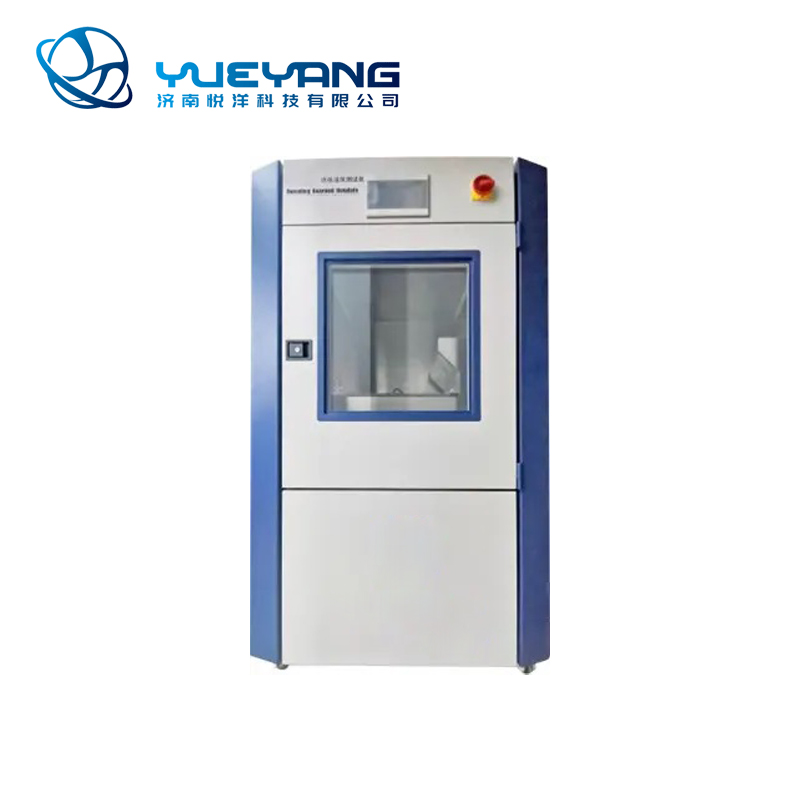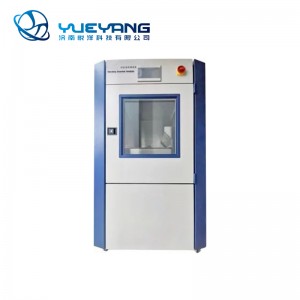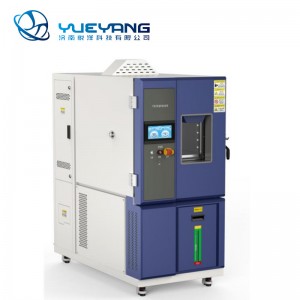YYT255 Sweating Guarded Hotplate
1.1 Overview of the manual
The manual provides the YYT255 Sweating Guarded Hotplate application, basic detection principles and detailed using methods, gives the instrument indicators and accuracy ranges, and describes some common problems and treatment methods or suggestions.
1.2 Scope of application
YYT255 Sweating Guarded Hotplate is suitable for different kinds of textile fabrics, including industrial fabrics, non-woven fabrics and various other flat materials.
1.3 Instrument function
This is an instrument used to measure the thermal resistance (Rct) and moisture resistance (Ret) of textiles (and other) flat materials. This instrument is used to meet the ISO 11092, ASTM F 1868 and GB/T11048-2008 standards.
1.4 Use environment
The instrument should be placed with relatively stable temperature and humidity, or in a room with general air-conditioning. Of course, it would be best in a constant temperature and humidity room. The left and right sides of the instrument should be left at least 50cm to make the air flow in and out smoothly.
1.4.1 Environmental temperature and humidity:
Ambient temperature: 10℃ to 30℃; Relative humidity: 30% to 80%, which is conducive to the stability of temperature and humidity in the microclimate chamber.
1.4.2 Power requirements:
The instrument must be well grounded!
AC220V±10% 3300W 50Hz, the maximum through current is 15A. The socket at the power supply place should be able to withstand more than 15A current.
1.4.3 There is no vibration source around, no corrosive medium, and no penetrating air circulation.
1.5 Technical Parameter
1. Thermal resistance test range: 0-2000×10-3 (m2 •K/W)
The repeatability error is less than: ±2.5% (factory control is within ±2.0%)
(The relevant standard is within ±7.0%)
Resolution: 0.1×10-3 (m2 •K/W)
2. Moisture resistance test range: 0-700 (m2 •Pa / W)
The repeatability error is less than: ±2.5% (factory control is within ±2.0%)
(The relevant standard is within ±7.0%)
3. Temperature adjustment range of test board: 20-40℃
4. The speed of the air above the surface of the sample: Standard setting 1m/s (adjustable)
5. Lifting range of the platform (sample thickness): 0-70mm
6. Test time setting range: 0-9999s
7. Temperature control accuracy: ±0.1℃
8. Resolution of temperature indication: 0.1℃
9. Pre-heat period: 6-99
10. Sample size: 350mm×350mm
11. Test board size: 200mm×200mm
12. External Dimension: 1050mm×1950mm×850mm (L×W×H)
13. Power supply: AC220V±10% 3300W 50Hz
1.6 Principle Introduction
1.6.1 Definition and unit of thermal resistance
Thermal resistance: the dry heat flow through a specified area when the textile is in a stable temperature gradient.
The thermal resistance unit Rct is in Kelvin per watt per square meter (m2·K/W).
When detecting the thermal resistance, the sample is covered on the electric heating test board, the test board and the surrounding protection board and the bottom plate are kept at the same set temperature (such as 35℃) by electric heating control, and the temperature sensor transmits the data to the control system to maintain a constant temperature, so that the heat of the sample plate can only be dissipated upward (in the direction of the sample), and all other directions are isothermal, without energy exchange. At 15mm on the upper surface of the center of the sample, the control temperature is 20°C, the relative humidity is 65%, and the horizontal wind speed is 1m/s. When the test conditions are stable, the system will automatically determine the heating power required for the test board to maintain a constant temperature.
The thermal resistance value is equal to the thermal resistance of the sample (15mm air, test plate, sample) minus the thermal resistance of the empty plate (15mm air, test plate).
The instrument automatically calculates: thermal resistance, heat transfer coefficient, Clo value and heat preservation rate
Note: (Because the repeatability data of the instrument is very consistent, the thermal resistance of the blank board only needs to be done once every three months or half a year).
Thermal resistance: Rct: (m2·K/W)
Tm ——testing board temperature
Ta ——testing cover temperature
A —— testing board area
Rct0——blank board thermal resistance
H —— testing board electric power
△Hc— heating power correction
Heat transfer coefficient: U =1/ Rct (W /m2·K)
Clo:CLO= 1 0.155·U
Heat preservation rate: Q=Q1-Q2 Q1×100%
Q1-No sample heat dissipation(W/℃)
Q2-With sample heat dissipation(W/℃)
Note: (Clo value: at a room temperature of 21℃, relative humidity ≤50%, airflow 10cm/s (no wind), the test wearer sits still, and its basal metabolism is 58.15 W/m2 (50kcal/m2·h), feel comfortable and maintain the average temperature of the body surface at 33℃, the insulation value of the clothes worn at this time is 1 Clo value (1 CLO=0.155℃·m2/W)
1.6.2 Definition and unit of moisture resistance
Moisture resistance: the heat flow of evaporation through a certain area under the condition of a stable water vapor pressure gradient.
The moisture resistance unit Ret is in Pascal per watt per square meter (m2·Pa/W).
The test plate and the protection plate are both metal special porous plates, which are covered with a thin film (which can only permeate water vapor but not liquid water). Under the electric heating, the temperature of the distilled water provided by the water supply system rises to the set value (such as 35℃). The test board and its surrounding protection board and bottom plate are all maintained at the same set temperature (such as 35°C) by electric heating control, and the temperature sensor transmits the data to the control system to maintain a constant temperature. Therefore, the water vapor heat energy of the sample board can only be upwards (in the direction of the sample). There is no water vapor and heat exchange in other directions,
the test board and its surrounding protection board and bottom plate are all maintained at the same set temperature (such as 35°C) by means of electric heating, and the temperature sensor transmits the data to the control system to maintain a constant temperature. The water vapor heat energy of the sample plate can only be dissipated upward (in the direction of the specimen). There is no water vapor heat energy exchange in other directions. The temperature at 15mm above the specimen is controlled at 35℃, the relative humidity is 40%, and the horizontal wind speed is 1m/s. The lower surface of the film has a saturated water pressure of 5620 Pa at 35℃, and the upper surface of the sample has a water pressure of 2250 Pa at 35℃ and a relative humidity of 40%. After the test conditions are stable, the system will automatically determine the heating power required for the test board to maintain a constant temperature.
The moisture resistance value is equal to the moisture resistance of the sample (15mm air, test board, sample) minus the moisture resistance of the empty board (15mm air, test board).
The instrument automatically calculates: moisture resistance, moisture permeability index, and moisture permeability.
Note: (Because the repeatability data of the instrument is very consistent, the thermal resistance of the blank board only needs to be done once every three months or half a year).
Moisture resistance: Ret Pm——Saturated vapor pressure
Pa——Climate chamber water vapor pressure
H——Test board electric power
△He—Correction amount of test board electric power
Moisture permeability index: imt=s*Rct/Ret S— 60 pa/k
Moisture permeability: Wd=1/( Ret *φTm) g/(m2*h*pa)
φTm—Latent heat of surface water vapor, when Tm is 35℃时,φTm=0.627 W*h/g
1.7 Instrument structure
The instrument is composed of three parts: the main machine, microclimate system, display and control.
1.7.1 The main body is equipped with a sample plate, a protection plate, and a bottom plate. And each heating plate is separated by a heat insulating material to ensure no heat transfer between each other. In order to protect the sample from the surrounding air, a microclimate cover is installed. There is a transparent organic glass door on the top, and the temperature and humidity sensor of the test chamber is installed on the cover.
1.7.2 Display and prevention system
The instrument adopts the weinview touch display integrated screen, and controls the microclimate system and the test host to work and stop by touching the corresponding buttons on the display screen, input control data, and output test data of the test process and results
1.8 Instrument characteristics
1.8.1 Low repeatability error
The core part of YYT255 the heating control system is a special device independently researched and developed. Theoretically, it eliminates the instability of the test results caused by thermal inertia. This technology makes the error of the repeatable test far smaller than the relevant standards at home and abroad. Most of the “heat transfer performance” test instruments have a repeatability error of about ±5%, and our company has reached ±2%. It can be said that it has solved the long-term world problem of large repeatability errors in thermal insulation instruments and reached the international advanced level. .
1.8.2 Compact structure and strong integrity
The YYT255 is a device that integrates the host and the microclimate. It can be used independently without any external devices. It is adaptable to the environment and specially developed to reduce the use conditions.
1.8.3 Real-time display of “thermal and humidity resistance” values
After the sample is preheated to the end, the entire “thermal heat and moisture resistance” value stabilization process can be displayed in real time. This solves the problem of the long time for the heat and moisture resistance experiment and the inability to understand the entire process.
1.8.4 Highly simulated skin-sweating effect
The instrument has a high simulation of human skin (hidden) sweating effect, which is different from the test board with only a few small holes. It satisfies the equal water vapor pressure everywhere on the test board, and the effective test area is accurate, so that the measured “moisture resistance” is closer real value.
1.8.5 Multi-point independent calibration
Due to the large range of thermal and moisture resistance testing, multi-point independent calibration can effectively improve the error caused by nonlinearity and ensure the accuracy of the test.
1.8.6 Microclimate temperature and humidity are consistent with standard control points
Compared with similar instruments, adopting the microclimate temperature and humidity consistent with the standard control point is more in line with the “method standard”, and the requirements for microclimate control are higher.











